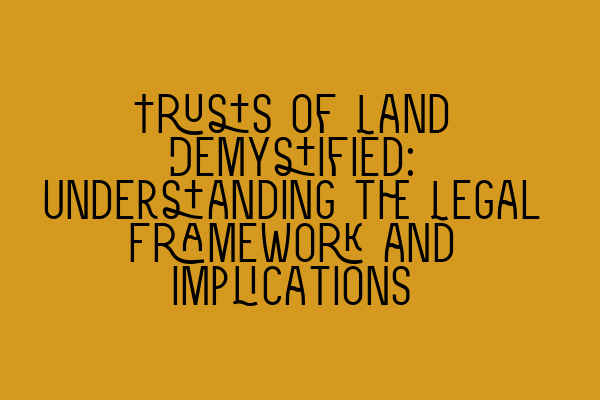Trusts of Land Demystified: Understanding the Legal Framework and Implications
Welcome to the SQE Property Law & Land Law blog, where we aim to provide you with valuable insights and information on various legal topics. In this blog post, we will delve into the fascinating world of trusts of land, unraveling the legal framework and implications associated with them. Whether you are a solicitor, law student, or simply someone interested in property law, this article will provide you with a comprehensive understanding of trusts of land.
But before we dive into the intricacies, let’s quickly define what a trust of land is. In simple terms, it is a legal arrangement in which property is held by one or more individuals (known as trustees) for the benefit of others (known as beneficiaries). Trusts of land can take various forms and serve different purposes, such as protecting assets, providing for loved ones, or facilitating business transactions.
Understanding the Legal Framework
Trusts of land are governed by a variety of legal statutes and common law principles, which provide the legal framework for their creation and administration. The key legislation that shapes the law surrounding trusts of land is the Trusts of Land and Appointment of Trustees Act 1996 (TOLATA). This statute sets out the rights and responsibilities of trustees, beneficiaries, and other interested parties.
According to TOLATA, the essential requirements for creating a trust of land include certainty of intention, subject matter, and object. In other words, there must be a clear intention to create a trust, a specific property involved, and identifiable beneficiaries who will benefit from the trust.
In addition to TOLATA, other statutory provisions and case law rulings further clarify the legal principles governing trusts of land. For instance, the Law of Property Act 1925 provides for the transfer and disposition of land held in trust, while court judgments have established important principles relating to the duties and powers of trustees.
Implications and Considerations
When dealing with trusts of land, it is crucial to consider the various implications and potential complications that may arise. Here are a few key considerations:
1. Legal Title vs. Beneficial Interest: In a trust of land, the legal title is held by the trustees, but the beneficiaries have a beneficial interest in the property. This distinction is essential as it determines the rights and responsibilities of the parties involved.
2. Trustees’ Duties and Powers: Trustees have a fiduciary duty to act in the best interests of the beneficiaries. They must exercise their powers and discretion prudently and in accordance with the terms of the trust and applicable legal principles.
3. Beneficiaries’ Rights: Beneficiaries have certain rights, such as the right to occupy or use the property, receive income generated from it, or request the sale or transfer of their beneficial interest.
4. Disputes and Resolutions: Disputes can arise between trustees, beneficiaries, or other interested parties. These disputes may require legal intervention, and the courts have the power to make orders for sale, partition, or other remedies.
5. Third-Party Interests: In some cases, third parties may have an interest in the property subject to the trust, such as lenders with a mortgage over the property. These third-party interests can impact the rights and obligations of the trustees and beneficiaries.
Conclusion
Trusts of land are a vital aspect of property law, offering a flexible and effective means of managing property rights and interests. Understanding the legal framework and implications associated with trusts of land is essential for lawyers, law students, and anyone dealing with property transactions.
If you found this article informative, you might also be interested in exploring our related articles on SQE preparation and exam dates. Check out our resources on SQE 1 Practice Exam Questions, SQE 1 Practice Mocks FLK1 FLK2, SQE 2 Preparation Courses, and SQE 1 Preparation Courses. Stay up to date with the latest SRA SQE Exam Dates and ensure you have the necessary knowledge and skills for success.
At SQE Property Law & Land Law, we are dedicated to providing comprehensive legal services and education. If you require professional assistance or guidance regarding trusts of land or any other property law matters, do not hesitate to contact our experienced solicitors who will be more than happy to assist you.
Disclaimer: This article is for informational purposes only and should not be construed as legal advice. You should consult with a qualified solicitor for advice regarding your specific situation.
